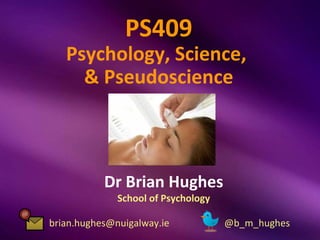
Psychology, Science, and Pseudoscience: Class #20 (Mystic, Postmod, Econ)
- 1. PS409 Psychology, Science, & Pseudoscience Dr Brian Hughes School of Psychology brian.hughes@nuigalway.ie @b_m_hughes
- 2. Question: If pseudoscientific reasoning is flawed, then why is it so popular?
- 3. Why does pseudoscience prosper? Socio-cultural explanations Consolation Luddism Mysticism “The academic left” and postmodernism Economic explanations Incentives of pseudoscience
- 4. Socio-cultural explanations: Mysticism That pseudoscience benefits from people’s apparent wish to explain life (or at least parts of it) in terms of concepts for which there is no clear evidence
- 5. Percentage of Irish population Number of CAM providers per declaring a religious affiliation 10,000 population Hughes (2006), J Rel Health
- 6. 4.5 r = -.57** 4.0 p = .002 CAM providers per 10,000 population 3.5 3.0 2.5 2.0 1.5 1.0 .5 0.0 91 92 93 94 95 96 97 98 Percentage religious Hughes (2006), J Rel Health
- 9. Why do some people prefer mysticism to science? Comfort in things that are “tried and tested” Change destabilizes homeostasis, threatens resources Mysticism is adaptive in evolutionary terms Promotes group solidarity, prosocial behavior Hard-wired into human brain? “Costly signaling” adaptation
- 10. Adaptiveness of mysticism (Sosis & Alcorta, 2003) Promotes group solidarity, enhances survival Minimises individual distinctiveness, emphasises unity Fosters commitment and loyalty Exemplifies “costly signalling” Mysticism advertises abundance of own resources Deters “free-riders”
- 11. Sosis (2000)
- 12. Sosis & Bressler (2003)
- 13. Socio-cultural explanations: “The academic left” and postmodernism That pseudoscience is promoted by some academic disciplines as a protest against the dominance of the traditional sciences
- 14. http://en.wikipedia.org/wiki/Highe http://en.wikipedia.org/wiki/Fa r_Superstition shionable_Nonsense
- 15. “The academic left” (Gross & Levitt, 1994) “an influential segment of the academic community…whose doctrinal idiosyncrasies sustain the misreadings of science…”, “unambiguously hostile to science”, “comprised, in the main, of humanists and social scientists” Branch of “Views science as…” Academic disciplines where academic left branch has prospered Postmodernism “…a social construction, no more ‘true’ than Philosophy, literary criticism, other ways of knowing” social history, anthropology Marxism “…a bourgeois manifestation of the capitalist Political science, economics order” Radical feminism “…poisoned and corrupted by an Philosophy, social anthropology, ineradicable gender bias” women’s studies Radical “…a ‘Western’ pursuit, inherently inaccurate Ethnicity studies, various mono- multiculturalism by virtue of its failure to incorporate the full ethnic ‘studies’ range of cultural perspectives” Radical “…an embodiment of the alienation from the Philosophy, sociology, cultural environmentalism direct experience of nature that is studies, social history accelerating us toward our ecological doomsday”
- 16. The Sokal Affair (Alan Sokal, NYU) Sokal, A. (1996). Transgressing the boundaries: Towards a transformative hermeneutics of quantum gravity. Social Text, 46/47, 217-252. • Argued that quantum theory had profound sociopolitical implications, but that an “emancipatory” science and mathematics should be developed to provide intellectual support for forward-looking political activists Sokal, A. (1996). A physicist experiments with cultural studies. Lingua Franca, 62-64. • Revealed the Social Text paper to be a fraud, to be based on nonsensical statements and factual errors, “a pastiche of left-wing cant, fawning references, grandiose quotations, and outright nonsense…structured around the silliest quotations I could find about mathematics and physics”
- 17. Economic explanations That, economically, pseudoscience presents both provider and consumer with (apparent) benefits that (apparently) outweigh (apparent) costs
- 18. Economic explanations Pseudoscience provides a belief-system akin to a “low tax economy” Caplan (2001) – Empiricism serves as “a tax” on beliefs – Taking assertions “on faith” removes this tax – Consumers, when free to choose, will gravitate toward “low-tax” options
- 20. Economic explanations Principle of “rational ignorance” Downs (1957) – Low “private error costs” disincentivize knowledge – Ignorance becomes economical Principle of “rational irrationality” Caplan (2001) –
- 21. Why does pseudoscience prosper? Socio-cultural explanations Consolation Luddism Mysticism “The academic left” and postmodernism Economic explanations Incentives of pseudoscience
- 22. PS409 Psychology, Science, & Pseudoscience Dr Brian Hughes School of Psychology brian.hughes@nuigalway.ie @b_m_hughes
